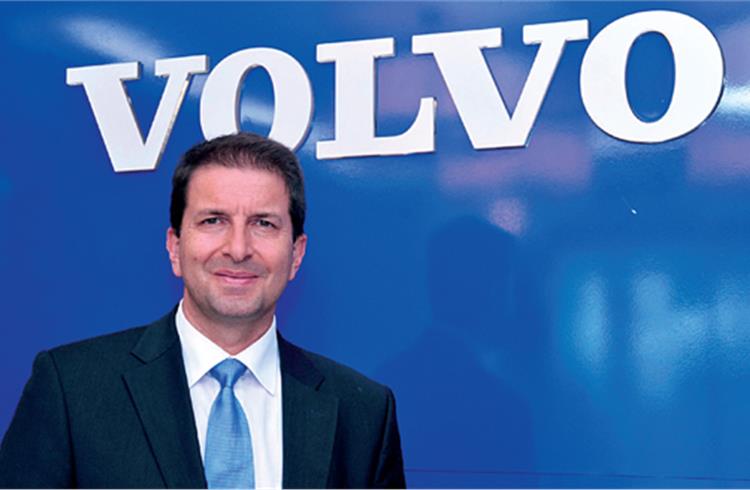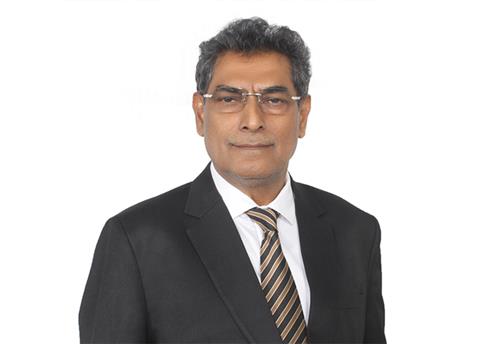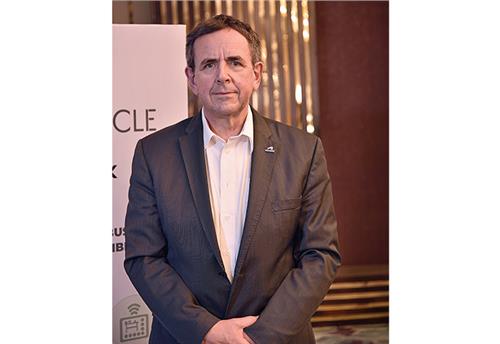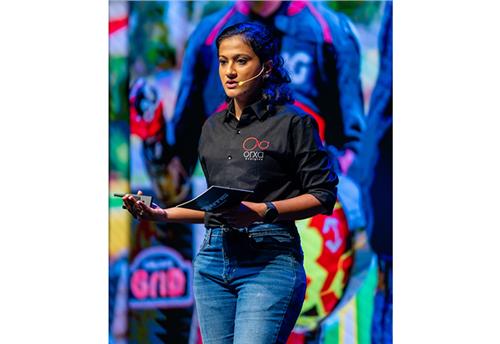September 15, 2012: Philippe Divry, Senior VP, Truck Joint Ventures and Volvo AB, Board Member, VE Commercial Vehicles
The senior vice-president, Truck Joint Ventures and Volvo AB and Board Member, VE Commercial Vehicles, speaks to Shobha Mathur on Volvo’s India gameplan.
Powertrain is a happening area for VECV with the upcoming annual 100,000 units engine plant at Pithampur that will hike engine capacity to 160,000 units by FY’17 along with existing Eicher engine capacity.
Yes, this will be a very specific product plant and the first one where big, global manufacturers leverage India as a manufacturing base for all their requirements. We will industrialise this base engine in India and ship it to our assembly factories in Europe. Normally, the industrialisation of a product takes place in Europe or in a western nation and is then brought to India. But at Pithampur, we are working the other way around with India pitted to be a global manufacturing hub for the base engines. The plant goes on stream by mid-2013 and will manufacture medium-duty four- and six-cylinder five- and eight-litre engines for Eicher trucks. The engines will also be exported to all of Europe with some headed to Thailand as well.
How will Volvo’s strategy for trucks be different for Volvo and Eicher in India?
We have a well-lined-up strategy for trucks. While exports will be a focus because there is a market for Eicher trucks outside India, there will also be cooperation between Volvo and VECV to export Eicher trucks. In fact, VECV has made significant investments in powertrain and the engine plant besides several other product projects in India. As far as Volvo Trucks is concerned, it sells only heavy duty trucks and does not export from India. However, VECV has a good export business and wants to export Eicher trucks further. We will focus on countries around India and on a network of distributors in the Indian Ocean area starting from the Arabian Peninsula to the east coast of Africa. Once we have upgraded our products, we will give a strong push to exports through the Volvo-Eicher network.
Since Volvo Trucks is predominantly servicing the mining sector, what impact has the current coal block logjam had?
The mining truck sales have dropped as a result of problems in coal mining. We are confident that the market will bounce back. But for the moment, we are following the market and are the undisputed No.1 manufacturer with a 60 percent market share in premium mining trucks. The long-term prospects in mining are promising.
The current year is just a few months away before it is curtains down. Any surprises in store for customers?
So far in 2012, we only launched a 14-tonne truck for Eicher. But next year there will be a progressive rollout of more products for Eicher with the introduction of new engines and cabins. We are modernising the truck range with selective injection of Volvo technology. We hope to cover the market better with the improved network. Volvo Trucks operates in a small niche market for premium trucks which is the same we sell in Europe. In that segment, next month, we will launch a new 10x4 mining truck with five axles, the biggest one that we have built in India so far.
Will Volvo explore options of bringing advanced truck models to India?
At the moment, the target is to implement our plans for Eicher with selective injection of technology in existing areas of the Indian mass market in the light, medium and heavy duty truck segments. Volvo dominates in the niche premium segment.
What challenges do you face in India?
The challenges relate to retention of talent and, of course, it is linked to the modernisation of industry. What can give a boost is improvement in infrastructure. India is investing a lot of money in aligning infrastructure but does not have a good road network. There is need for some bottlenecks to be removed to optimise productivity so that you can have good speed on the roads. Then only will it be more profitable to drive modern trucks on the roads. So it is a chicken-and-egg situation as it is not only about money but also goal alignment of different people. Two things are required: the upgradation of regulations for new trucks. I believe there can be a big impact by restricting the age and technical status of trucks permitted to ply on the roads. It will be a much more efficient system that takes the old trucks off the roads rather than one that merely enforces more regulations on new ones. We have talked about Euro IV regulations and the difficulty of getting low sulphur fuel but about 50 percent of the truck population are BS I and even lower. These cause the maximum pollution. Volvo’s new trucks will comply with regulations and will be Euro IV and III-compliant.
Can you throw some light on the roadmap for both Eicher and Volvo trucks in India?
We see growth very clearly on the Eicher side and have announced our intention to increase marketshare in heavy duty trucks. VECV has a strong presence in light and medium duty trucks with over a 30 percent marketshare. We want to progressively leverage that distribution network to market our heavy duty trucks. Volvo is also keen on playing a key role in the mining industry. We hope to see a rebound in that industry as it has a huge potential. If the coal blockade is freed up, there will be a huge market for mining trucks.
Is Volvo planning to bring its suppliers to India?
If you take the Volvo-Eicher joint venture, then it is clear that there is 95 percent localisation in the India products. In terms of Volvo trucks, at the moment we are running CKD operations because volumes are small and some components like tyres, batteries and seats are localised.
Will Volvo explore localisation of CKD operations in India?
Volvo has already localised a part of the kits. A lot depends on factors such as the value of the rupee, among other things.
The Chinese truck market has not been faring too well. In comparison, where does India stand?
China is experiencing an even clearer and violent decline in the truck segment than India is. The Indian economy has been growing more rapidly and the numbers are big in comparison. India was still in the equipment phase so they have more needs while China was more advanced in their equipment, so it is more in the replacement stage. That makes for bigger swings in the truck market.
How do you perceive the global trends in the truck market?
We are seeing more technology and modernisation with a cost consciousness. India is the most cost-competitive market in the world; so if you are competitive here, then you can be competitive anywhere in the world. I focus on cost and need for fuel efficiency and though customers have not yet realised it, there is tremendous potential for vehicle makers to improve their operating costs. Urbanisation is even more important in India than elsewhere in the world.
With rising competition, does Volvo have a plan to expand further in India?
We have no plans of setting up a new plant in India as we have a facility at Bangalore for trucks and buses and another facility at Pithampur. In the latter, we have made significant investments for the new engine as well as new paint shop for cabins and have installed a new welding line for the upgraded products. In terms of R&D, we inaugurated a centre eight years ago in Bangalore and are steadily growing its activities and responsibility for complete components for complete products as well as meeting Volvo’s R&D requirements globally.
How do you see the truck industry panning out going forward?
Over the last five years, there has been tremendous growth in the heavy duty truck market though at the moment it is plateauing and experiencing a flat growth but it still remains quite high. The medium term prospects remain strong. If you look at other truck markets outside India, they go through fairly brutal cycles, and the commercial vehicle industry and truck industry in general amplifies the up-and-down cycles compared to the average economy. So a professional in that industry has to learn to live with those cycles.
RELATED ARTICLES
BRANDED CONTENT: 'We aspire to be among the leading sensors and electro-mechanical products manufacturer'
P. Parthasarathy, Founder & Managing Director, Rotary Electronics Pvt Ltd shares the company's commitment and vision to ...
‘Big opportunity for startups lies in products in India’: Detlev Reicheneder
As electrification levels the playing field, the focus on tech and R&D to bring innovative products is the mantra for st...
'I hope my journey makes people say — I can do this too'
Ranjita Ravi, Co-founder of Orxa Energies — the maker of Mantis e-bikes — shares the challenges of building a startup an...





 By Autocar Pro News Desk
By Autocar Pro News Desk
 17 Sep 2012
17 Sep 2012
 2631 Views
2631 Views









